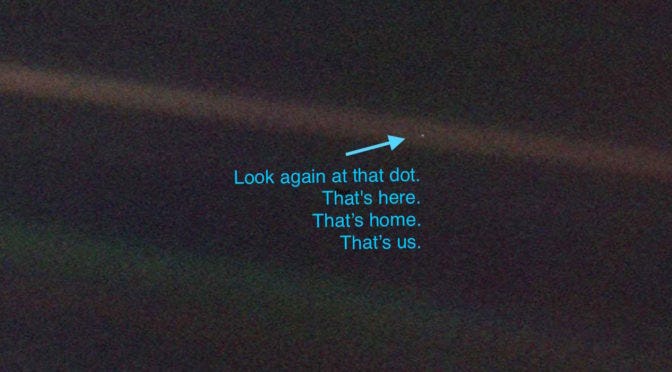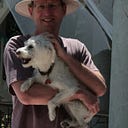“The Pale Blue Dot” by Carl Sagan.
If it were in my power, every person on the planet would read this.

Please don’t start it unless you intend to read it all, and read it carefully. In the incredible words of Carl Sagan:
“We succeeded in taking that picture, and, if you look at it, you see a dot. That’s here. That’s home. That’s us. On it, everyone you ever heard of, every human being who ever lived, lived out their lives.
The aggregate of all our joys and sufferings, thousands of confident religions, ideologies and economic doctrines, every hunter and forager, every hero and coward, every creator and destroyer of civilizations, every king and peasant, every young couple in love, every hopeful child, every mother and father, every inventor and explorer, every teacher of morals, every corrupt politician, every superstar, every supreme leader, every saint and sinner in the history of our species, lived there — on a mote of dust, suspended in a sunbeam.
The Earth is a very small stage in a vast cosmic arena. Think of the rivers of blood spilled by all those generals and emperors so that in glory and in triumph they could become the momentary masters of a fraction of a dot. Think of the endless cruelties visited by the inhabitants of one corner of the dot on scarcely distinguishable inhabitants of some other corner of the dot. How frequent their misunderstandings, how eager they are to kill one another, how fervent their hatreds. Our posturings, our imagined self-importance, the delusion that we have some privileged position in the universe, are challenged by this point of pale light . . .
To my mind, there is perhaps no better demonstration of the folly of human conceits than this distant image of our tiny world. To me, it underscores our responsibility to deal more kindly and compassionately with one another and to preserve and cherish that pale blue dot, the only home we’ve ever known.”
— Carl Sagan, speech at Cornell University, October 13, 1994
The mightiest among us, the most powerful we know, are all but fleeting masters on micro-fractions of a dot. When you next have the hubris to believe you are important, that a problem you have is important, that anything you know is important, think of this.
It’s a pathetically small dot we inhabit, but it is also the only dot we have. Neither that dot, nor we, are nearly as majestic as we like to presume. Still, it is all we have.

